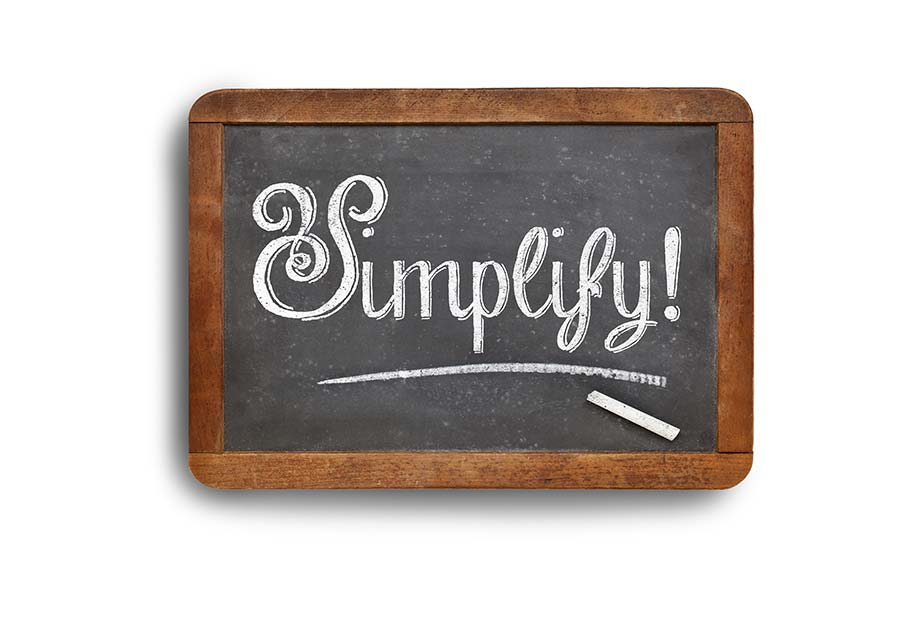Eating simplified
Over our kitchen pantry door hangs a sign with one word on it: Simplify. It is my reminder to try to avoid overcomplicating my life. It is one of those goals that is always a work in progress and never more so than in the area of what to eat.
Besides breathing, eating is the most basic activity we engage in as living organisms. You would think something so important would be instinctual and somewhat unconscious, like the beating of our heart, function of the GI tract, and so on. Instead, we have complicated it to the point where I find few people who are totally comfortable with their diet. How did it get this way?
The course of human history, which we often lump under the term “progress,” is a continual process of increasing complexity. We have gone from the Stone Age to the Computer Age in what is a mere blip in the history of our planet. The more we learn, the more complicated things become, and our diet is a perfect example. For much of human history, we were happy to have food, any food. As we segued from hunting and gathering to farming and domesticating animals for our use, we switched from basic subsistence to producing more than we could consume, which gave rise to commercial food production. Now, we have become so proficient in producing cheap, abundant food that our problem is that we have too much of it, and it is killing us.
Nutritionists, physicians, and researchers agree that the basic American diet, rich in refined carbohydrates, simple sugars, salt, unhealthy fats, and calories is a major contributor to most of our health problems as a nation: obesity, metabolic syndrome, cancer, heart disease, high blood pressure, stroke, dementia, immune disorders, and more. There are few health problems that are totally independent of what we eat.
The worldwide range of human diets is huge, from the Inuit, who eat a diet consisting of lots of meat and fat with little in the way of fruits and vegetables, to Okinawans, whose diet is primarily vegetarian with some fish and a little meat thrown in. I suspect most people do not follow a particular diet or, if they do, they do so without giving it much thought. If you try to choose a particular diet, which of the countless variations do you go with? A few choices are below with some comments about them.
Organic—Most physicians and nutritionists agree that a strictly organic diet, while attractive, is probably unnecessary. There are some food items that are best if organic, but a totally organic diet is not easy and can be expensive. Online sources typically list relatively few foods where choosing organic really matters.
Vegetarian—This can be complicated as there are so many variations on a vegetarian diet. A totally vegetarian diet, known as vegan, requires care to obtain all the necessary nutrients needed by our body. Ovo- and lacto-vegetarians eat eggs and dairy products, respectively, which avoids some of the vegan issues. Vegetarians claim many health benefits, some of which are real. For many people, a diet devoid of any meat is simply not acceptable.
Gluten-free—It seems everywhere you look, people are turning to gluten-free diets and claiming all sorts of benefits from them. Relatively few people are truly intolerant of gluten, and some of the benefits may be more psychological than actual. To those who feel better, the distinction is probably moot.
Low carb/high fat—The archetype of this is the Atkins Diet, which was very controversial for a long time. Now, more and more studies are showing a true health benefit for some specific individuals of limiting their carb intake and eating more healthy fats. Properly done, this diet can yield many benefits, but it takes time and attention to do it properly. For some, it is very restricting and hard to stay on long term.
Paleolithic—This is an attempt to follow the diet we presume our hunting/gathering ancestors ate. I chuckle at this one because, from what we have learned from paleontology, our caveman ancestors were not particularly healthy and did not live very long. Besides, our modern lifestyle is about as far from that of cavemen as you can get.
Named diets—It would take more than this magazine to list all the named diets out there, each one with a unique twist that distinguishes it from the others. Some of these better-known diets include the South Beach, Pritikin, Scarsdale, Fast Metabolism, Macrobiotic, Beverly Hills, DASH (Dietary Approaches to Stop Hypertension), Jenny Craig, and Weight Watchers. Each has pros and very real cons.
In my humble effort to simplify things, I would make the following suggestions:
Try to obtain locally sourced food when you can. It is fresher and supports local businesses/farms.
Try to eat mostly foods you prepare yourself, from simple, basic ingredients.
Try to emphasize whole grains, nuts, fruits, vegetables, and healthy fats, such as olive oil.
Try to limit your intake of dairy and animal foods like beef, pork, and chicken.
Take time to search out sustainable sources of food, especially for such items as seafood.
Cut down your portion sizes. Avoid eating out more than a couple of times per week because prepared foods are usually too rich in sugar, salt, and unhealthy fats, and portions are too large.
Don’t forget that there is much more to eating than simply putting food in your mouth. Food serves to bind us together as families, social groups, and even communities and cultures. It should be enjoyable and not a burden. It should not require an advanced degree or constant mental effort. In his book “Food Rules—An Eater’s Manual,” author Michael Pollan offers succinct advice that he summarizes in seven words: “Eat food, mostly plants, not too much.”
It’s that simple.

